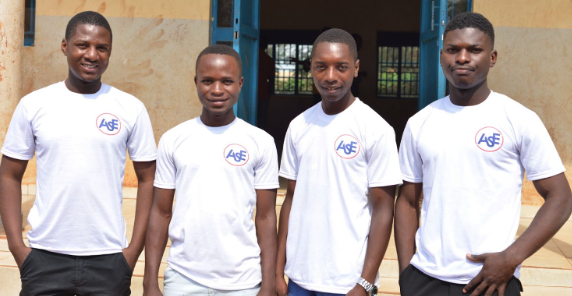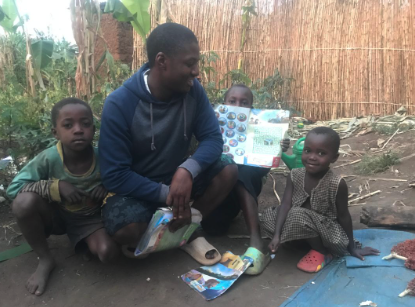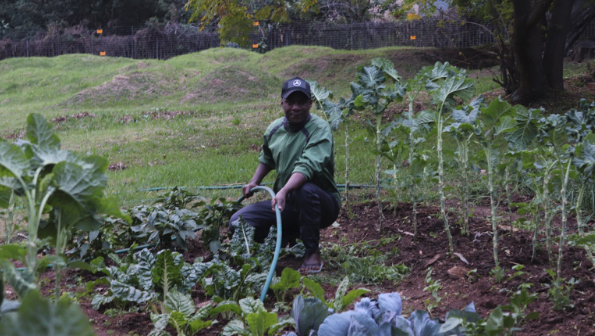Sowing Seeds of Resilience
By Fabris Mulindi, CEO and Founder of SOLFA
For as long as I can remember, my biggest dream has been to graduate. In my community, stepping onto a graduation stage is more than just an academic achievement—it is a symbol of survival, proof that one has defied the odds. I envisioned myself standing proudly, surrounded by familiar faces, capturing my accomplishments in photographs, and celebrating with those who believed in me. However, for 19 years, this milestone eluded me. It was not until June 2024 that I finally graduated from high school at African Leadership Academy with the Sani Prize, a moment that marked the culmination of years of struggle and resilience.
I was born in the Democratic Republic of Congo, but my family and I were forced to flee due to war, seeking refuge in Uganda’s Kyangwali Refugee Settlement. The move shattered our lives. We arrived with nothing, thrown into an unforgiving world where survival was a daily battle. The concept of “home” became transient; every day in the settlement reminded us that we were displaced, powerless and forgotten. We lived in makeshift structures for a while, relying on humanitarian aid that was never enough.
It was not long before I started schooling at Kasonga Primary in the camp. Attending school in Kyangwali was a privilege only a few could afford, even though education was our only hope for escaping the cycle of poverty. At Kasonga Primary School, the reality of the gap in education was stark—my first classroom was packed with over 300 students, some standing, others, including me, seated on the bare dusty floor. There were no reading books, textbooks or libraries at the time, and the teachers were overwhelmed by the number of pupils they had to take care of. My visual impairment, a condition I had since birth, made learning even harder. I struggled to see the blackboard, and there were no resources to accommodate students like me. Instead of support, I faced relentless bullying from peers and sometimes teachers. I was labeled the “half-blind kid,” mocked for my inability to see clearly or follow along in class. The taunts became unbearable. In my primary four, I had to drop out of school, defeated by a system that seemed designed to exclude me.
For two years, I remained out of school, working in gardens, doing household chores and taking care of my younger siblings. I watched the education system determine who deserved respect and who did not in society. A pivotal moment came when a peer from a wealthier background visited our village. He read aloud in English, effortlessly navigating words that I could barely understand. Everyone around me respected him for his ability to speak and read English, while I was criticized for dropping out of school to care for my younger siblings and assist my parents with farming and household chores. That moment crushed me. I saw, with painful clarity, how society viewed those who lacked formal education: as failures, destined for a life of poverty. It was then that I resolved to fight for my future. I returned to school, determined to reclaim my dignity and rewrite my story.
The struggles my community and I faced were not isolated incidents; they were rooted in larger systemic failures. In Kyangwali, over 99% of the population, including my own family, relied on subsistence farming. But the land, once fertile, was rapidly becoming barren. Climate change made rainfall unpredictable, soil quality deteriorating, and invasive pests destroying harvests. The society clung to the hope that working harder would bring better yields, but no amount of digging could change the fact that the land was dying, climate change was worsening and environmental degradation was increasing.


The consequences were devastating. Families who once lived off their farm produce found themselves unable to put food on the table. Malnutrition rates soared followed by economic breakdown and inaccessibility to basic needs. Children, instead of attending school, were sent to the fields to work. The dropout rate increased exponentially, with thousands of students leaving school each year, not because they lacked ambition, but because education became an unaffordable luxury. Without food security, everything else crumbles. Healthcare deteriorates, crime increases and an overwhelming sense of hopelessness consumes a society.
For my family, these struggles were personal. There were nights we slept hungry, surviving on cassava or sweet potatoes if we were lucky. My younger siblings would wake up in the middle of the night, crying from hunger pains. It was a cruel reality—one that exposed the cracks in our social system. Education was supposed to be a pathway out of poverty, but how could we focus on learning when our stomachs were empty?
The economic collapse of our community mirrored the destruction of our educational institutions. Schools lacked the most basic resources—no books, no clean water, no desks. Teachers, underpaid and overburdened, often abandoned their posts. These realities extend beyond my community—they have existed for generations and continue to persist in countless African communities and beyond. The system was broken, and we were trapped in it.
I refused to accept that this was the only fate available to us. Pursuing education alone wasn’t and isn’t enough—I had to be part of the solution, I knew that if the system was broken, we had to build a new one. This realization led me to start Solve and Flourish Africa (SOLFA) —a social enterprise dedicated to addressing the intersection of agriculture, climate change, education gaps among other social challenges.
SOLFA works to empower marginalized communities, including refugees, by providing innovative solutions to agricultural challenges. We focus on sustainable farming techniques that combat soil degradation, irrigation solutions that mitigate water scarcity, and education programs that equip youth with skills beyond traditional schooling ensuring that children don’t have to choose between education and survival. By integrating sustainable farming, environmental restoration, and social impact, SOLFA is not just about growing food—it’s about rebuilding communities and securing a future where education and prosperity are within reach for all.


